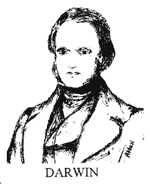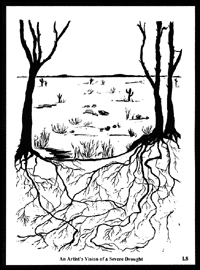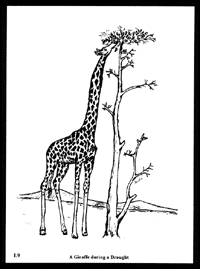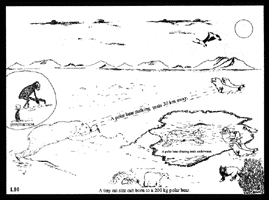| Natural Selection and Survival of the Fittest  NSWERING the question as to who has been responsible, throughout the ages, for taking important decisions, which had to be taken at every step of evolutionary advancement, the Quran pronounces the following: NSWERING the question as to who has been responsible, throughout the ages, for taking important decisions, which had to be taken at every step of evolutionary advancement, the Quran pronounces the following:
Blessed is He in Whose hand is the kingdom, and He has power over all things; It is He Who has created death and life that He might try you—which of you is best in deeds; and He is the Mighty, the Most Forgiving, The Same Who has created seven heavens in stages ( ). No incongruity can you see in the creation of the Gracious God. Then look again: Do you see any flaw? ). No incongruity can you see in the creation of the Gracious God. Then look again: Do you see any flaw? Aye, look again, and yet again, your sight will only return to you tired and fatigued. 1 In the absence of God, life could not have travelled on a purpose-built path following a single direction throughout. At every step there was a wide aimless expanse of possibilities stretched before it, riddled with difficulties through which it had to carve its path. There were countless options which could potentially have changed the course and direction of evolution at every such critical moment in time. The question arises as to why life pursued a definite evolutionary course in a single direction as though none else was available. The only explanation offered by scientists relates to the role of natural selection. Though they fully recognize the dimension and the gravity of the problem, they would have us believe that at every crucial point of decision making it was natural selection which took the decision, always making the right choices out of a countless number of available options.
 Ever since Darwin coined the phrase 'Natural Selection', it has served as a magic wand for the scientists who probe into the mysteries of nature. In relation to events which appear to present evidence of the role of a wilful Conscious Creator as the choice maker, they seek protection behind the mist of this vague term which is mostly incorrectly understood. Every step forward in the path of evolution is inadvertently attributed by them to innumerable chances having created a host of options for natural selection to choose from. But this choice, on the part of natural selection, they agree, is not conscious. When different characters and species struggle for survival in a competitive situation, it is quite natural for some to survive at the cost of others if they happen to possess greater potential for survival. Ever since Darwin coined the phrase 'Natural Selection', it has served as a magic wand for the scientists who probe into the mysteries of nature. In relation to events which appear to present evidence of the role of a wilful Conscious Creator as the choice maker, they seek protection behind the mist of this vague term which is mostly incorrectly understood. Every step forward in the path of evolution is inadvertently attributed by them to innumerable chances having created a host of options for natural selection to choose from. But this choice, on the part of natural selection, they agree, is not conscious. When different characters and species struggle for survival in a competitive situation, it is quite natural for some to survive at the cost of others if they happen to possess greater potential for survival.
Here we may also mention another hackneyed phrase of Darwinian terminology 'The Survival of the Fittest' which is so extensively used by the naturalists. This phrase is coined on the presumption that natural selection, however blind it may be, would always go for the right choice and only the fittest would survive in a competitive world. Whatever is inferior in the struggle for existence is doomed to become extinct. Darwin's principle is perhaps misinterpreted to a degree that the very principle becomes questionable. We have irrefutable evidence spread all over the globe that even the most inferior character bearing species and the most ill-equipped animals at the lowest rung of evolution are still found to have survived. The extinction of some, as against the others, only takes place when the contest for survival is extremely severe and mutually confrontational. Then too, it does not invariably lead to the survival of the fittest in its absolute sense. Survival of the fittest in its absolute sense, though possible, is yet unlikely to occur in the case of every struggle for existence. The fittest at such outcomes would only be the fittest in relation to that particular challenge. The unfortunate who may not survive these moments of trials may otherwise possess many more highly advanced qualities of life which may adjudge them to be the fittest in some other contexts.  ET US elaborate this further by visualizing the scenario of a grave famine resulting from a rare spell of drought covering an entire continent. Such a famine, if it persists for too long, is likely to bring to extinction a large number of species. The issue of extinction or survival would hang on the respective compatibility of the species in the given situation. ET US elaborate this further by visualizing the scenario of a grave famine resulting from a rare spell of drought covering an entire continent. Such a famine, if it persists for too long, is likely to bring to extinction a large number of species. The issue of extinction or survival would hang on the respective compatibility of the species in the given situation.
 | A Severe Drought
(click to enlarge) | In a famine as severe as the one we are visualizing, almost all shrubs, bushes, trees and grasses with short roots, would be completely annihilated. The obvious reason for this is that the water level sinks lower and lower as the famine strikes deeper and deeper, until with the total dryness of the upper soil, the shorter roots are completely dehydrated. But this may not be the fate of some trees with very long, deeply entrenched roots. Such roots are known to have reached astounding depths during long-lasting spells of severe droughts. There are many caves in mountains that have been explored by archaeologists which bear witness to this fact. Some roots of trees which stood right on the top of a mountain appear to have chased the water as it sank to amazingly low depths. Similarly, despite periodic long spells of droughts in deserts, the secret of the survival of an oasis lies in this ability of the roots of some trees to chase water. In the scenario under study, one can reasonably expect all the short root shrubbery, bushes, trees and grasses etc., to have been completely wiped out, whereas some tall trees with tapering, long embedded roots could withstand even worse droughts. Let us now visualize what would happen to life in general upon such a continent during this period of extreme trial. Most of the grazing animals with shorter legs and necks would most certainly be starved or dehydrated to death. So also the carnivores among the animals would not survive much longer after their food supply had dwindled out of existence. Maybe the only survivors would be those who could survive on very little water such as worms, scorpions, and millipedes and those animals which take their daily need of water by feeding on them with relish. Among them, meerkats are known to possess exceptional qualities to survive in such hostile environments. Some sorts of rodents could perhaps also share a fighting chance to crawl across an overly extended drought.  | A Giraffe during a Drought
(click to enlarge) | Among tall vertebrates however, there is one likely candidate who could have an outside chance to survive. For giraffes with exceptionally long necks and tall forequarters, it is not impossible to reach the green foliage on the tops of tall deep-rooted trees while all other species of grazing animals would be starving to death all around them. There are also other factors which have to be brought to the focus of attention. There are animals which can run fast for long distances in search of whatever water holes remain available, and there are slow moving animals as well, at evident disadvantage. There are others better equipped with the sense of detecting water at long distances, and there are those who must find water right under their noses. We have also to include in the picture the role of the beasts of the jungle who must thrive on the flesh of grazing animals, and follow them wherever they go. They too, in turn however, need water for their survival. It is painful to visualize at what tragic moment the curtain of this bizarre drama will fall at last. They must depart this stage fatigued and starved one after the other. Maybe the only spectators left behind will be some giraffes, some vermin, some meerkats, in the vast empty amphitheatre of this continent where this ghastly drama is playing its last act. Maybe the only applause that will be heard would be the tiny clapping of the meerkats, or the neighing of the giraffes—if they have any neighing strength left in them—applauding their own survival! Is this the survival of the fittest? Is this what the scientists clamour about? Is this what they mean by natural selection at work? Do the qualities of the giraffes and the meerkats, not to mention those of a few species of vermin which survived, really represent the ultimate evolutionary preferences? In a billion years, hundreds of such alternating waves of drastic fluctuations in the climate can be realistically estimated. There would have been times when life was threatened with excessive cold or with excessive heat. There would have been times when life was threatened with excessive drought or excessive rains; there would also have been many scores of diseases attendant upon all such climatic changes. Whatever may have survived during the periods of these varying trials would not always be the giraffes and the meerkats, or the vermin for that matter. In every changed context, the principle of the survival of the fittest would favour the survival of different contestants. Every calamity would have its own preferences. Looking at the issue of survival in relation to varying threats and challenges to life as it hazards its journey through a billion years of evolution, it is hard to visualize any survival at all. Little chance, if any, can be envisaged for the survival of all the forms of life, because different crises will have their own favourite targets which most often will not be the same. The poison for one category of life would be the meat for another. So the law of random selection would choose at random and continue to reject all that cross its path.  E HOPE that by now the reader will have fully comprehended the nature and dimension of the problems involved in the operation of the survival of the fittest and natural selection. It should be remembered here that the term 'Natural Selection' is not being comprehensively examined in all its areas of application. We have only specifically taken up one of its many aspects to suit this context. E HOPE that by now the reader will have fully comprehended the nature and dimension of the problems involved in the operation of the survival of the fittest and natural selection. It should be remembered here that the term 'Natural Selection' is not being comprehensively examined in all its areas of application. We have only specifically taken up one of its many aspects to suit this context.
In Darwin's theory of biological evolution, as observed in comparatively more advanced species of life, the role of natural selection can be more easily discerned. But there also, it is found to be inadequate in accepting the right values and discarding the wrong ones. Again, it should be emphasized here that the phenomenon of natural selection under changing environments does not possess any instrument of effecting internal cellular changes to suit the external requirements. The chromosomes and the character bearing genes lie far beyond the reach of chaotic external changes. The natural laws which govern them are insulated from the whims of cold and heat, or dryness and humidity. They are two absolutely unrelated phenomena. Natural selection becomes operative only after a host of variants are created through progressive or random genetic changes. In the competitive world of the variants, thus created by 'chance', only those are able to survive which are proved fittest in relation to the given challenges. With a change in the nature and character of challenges, the definition of preferred characters would also change. Hence, this misconception that natural selection would always favour the best characters in all varying situations should be dispelled once and for all. Occasionally it may do so, but most often it does not. The term is largely relative and rarely definitive regarding its choices. The competition for survival can be between members of the same species, or between different species. It is only the chance outcome of a given situation which decides the quality of the surviving factors. Blind struggle for existence cannot always aim at the right qualities. Whatever emerges, bad or good, must be accepted as the fittest. A particular species could be adjudged as champion with regards to its potential for survival in a specific situation. The species that becomes extinct could have possessed more advanced qualities and characters in other regards.  | | (click to enlarge) | Consider for example the case of a solitary gorilla left stranded in a hostile arctic environment. In comparison to it, the polar bear and foxes stand far greater chances of survival in the same habitat. In that particular case the gorilla, despite its comparative evolutionary advancement, would be condemned to extinction by the instrument of natural selection as a worthless thing in comparison to the polar bear and the arctic foxes. Replace the gorilla with a human in the same hypothetical situation, the condemnation of him to death by the principle of survival of the fittest will be speedier than in the case of the gorilla. Hence it is wrong to believe that natural selection goes for quality as such. In the barest terms, natural selection can at best be described as 'might is right'; even when might is vicious, distorted, oppressive and merciless, might will always emerge victorious in the sight of natural selection. If we undertake the work of tracing the history of evolution in relation to all the various forms of life and try to determine how the principles of natural selection and survival of the fittest actually work, it would exhaust voluminous books running into hundreds of thousands of pages or more. It would take many generations of future scientists to pursue this task. However, we must draw the attention of the reader to the fact that if one visualizes all the possible options at work, progressive selection would become impossible. At every such occasion where this discrimination is needed, it may take millions of chances to collude for the selection of a single superior character. The converse should also be seriously considered. For haphazard mutations to jump in any direction, is not controversial, but for them to always jump in the right direction, to advance the cause of evolution towards a definite goal, is next to impossible. Hence, in a game of chance, as indeed it is a game of chance, is highly implausible for it to always take the stride in the right direction as needed by the dictates of evolutionary requirements at that point in time. It is unfortunate however, that most scientists shut their eyes to the inevitability of the Hand of a Conscious Wise Selector Who will always take the right decisions at the right moment and will not leave them to the throw of a dice.  OW CAN IT be possible for evolution to continuously march forward in the direction of man while at each moment the possibilities of its taking the wrong steps backwards are overwhelmingly larger? The only possible solution to this otherwise insoluble dilemma would be to follow the backward escape route envisaged by a boy during a rainy day. Once, it is said, a boy reached his school very late. When severely reprimanded by his teacher, he offered the excuse that the road to school was so muddy and slippery that as he took one step forward in the direction of the school, he slipped back two steps. OW CAN IT be possible for evolution to continuously march forward in the direction of man while at each moment the possibilities of its taking the wrong steps backwards are overwhelmingly larger? The only possible solution to this otherwise insoluble dilemma would be to follow the backward escape route envisaged by a boy during a rainy day. Once, it is said, a boy reached his school very late. When severely reprimanded by his teacher, he offered the excuse that the road to school was so muddy and slippery that as he took one step forward in the direction of the school, he slipped back two steps.
'How on earth did you reach the school at all?' shouted the angry teacher. 'Excuse me, sir,' was the apologetic reply of the boy, 'It struck me rather late, that I should start walking in the direction of my house instead of that of the school. The moment I did it, I began to slide backwards towards the school at an even faster speed than I ordinarily maintain. And here I am sir, hitting the back of my head against the school wall, such was my haste to reach here, backwards all the way.' The dilemma that life faces, if left entirely to the mercy of chance, is far more exasperating than the case of that boy. At each step forward, evolution driven by chance should have slipped a hundred thousand steps backwards. But for life with no prefixed direction, as some naturalists believe, the concept of a step forward simply does not arise. Forward in which direction and to what end, are the questions which can never be answered in relation to chance being its creator. Every step it took could be in any direction. Hence even turning the journey of life backwards could not resolve the problem. Man not being the ultimate goal of evolution, life would lose its bearing in the wilderness of chaos, squandering each quality it had gained, by chance, to the stormy aimless winds of annihilation. Whatever the mutative changes might have gained, they may lose by other leaps in wrong directions. Let us apply the same logic to the creation of eyes and examine how blind mutative changes could have succeeded in manufacturing even a most rudimentary eye which could see and transmit what it saw to the brain behind. It is far more likely for mutation, or gradual cellular development, to disorganize what it has created itself, than for it to organize the surrounding confusion with the passage of time. The haphazard mutative changes created only by chance could actually play havoc with the orderly shape and design of life. It could change, for instance, the positioning of the eye, the nose, the ear, the mouth, the tongue and their sensory buds. Maybe in a few subsequent generations some species could have eyes shifted to the back of their heads instead, or upon their stomachs, or one each under their armpits! Who can stay or discipline the hand of chance? Again, it is not unlikely that the ears could begin to see, the nose could talk and the tongue could hear, ankles could grow with buds of taste and smell! Different animals, at least some of them, should have exhibited such freaks of nature without a purpose to serve. But wherever in nature we find a shifting of the ear or the eye from their normally expected position, it is always done purposefully, being of advantage to the animal concerned rather than of disadvantage. But these are exceptions. The rule that governs millions of species dictates a universal design. When we observe chance at work it behaves differently; babies are born with congenital disorders, alas never to their advantage. Who knows? A game of chance is a game of chance. The task of examining the evolutionary processes which led to the making of an eye require a thorough, in-depth study. Also, the evolution of all animal organs, which make complex, yet perfect little worlds of their own need to be examined in depth. It is intended, therefore, to add a separate chapter on the creative processes which resulted in the creation of complete organic units, eyes being central to the discussion. Unfortunately, the physical features of species as they evolve have been far more emphasized by naturalists than their sensory organs. However, mere physical changes in a certain direction are of no significance compared to the advancement of awareness and consciousness in the grand scheme of the evolutionary spiral. What is Life after all, if it is not awareness, as against the absolute unawareness of Death? The most dramatic miracle does not take place on the plane of mere cellular changes and complexities of molecules at the level of proteins. The miracle of the origin of life lies in the sudden dawn of consciousness upon the horizon of the dead universe that preceded it. Ever since that happened it continues to grow from weakness to strength, from a lone beginning to diversity. The meaning of evolution can in no way be understood by confining oneself to the Darwinian principle of haphazard physical changes being selected and grouped together by the hand of natural selection. It can only be comprehended by gaining a better understanding of the five senses which ultimately evolved after the hazardous journey of life during its last billion years. Man can look down from his vantage point at whatever lies behind him and below him. Only then will he realize the meaning of life and the meaning of evolution—bit by bit, nanometre by nanometre; the senses once born climbed through the spiralling path of endless evolution. The purpose and philosophy of evolution is doubtlessly the creation and promotion of the five senses. The creation of five senses, each of which in itself is a masterpiece of creative wonders, stands witness to a well-executed design at the grandest scale, where harmony rules supreme. No wonder then, that the Holy Quran repeatedly sums up the outcome of evolution in just three simple terms: the creation and perfection of the faculty of hearing, seeing and understanding. And Allah brought you forth from the wombs of your mothers while you knew nothing, and gave you ears and eyes and hearts, that you might be grateful. 2 To return to the main subject of discussion, let us emphasize once again that mutative changes could go far more often wrong than right, leaving little room, if any, for natural selection to choose from, for the betterment of life. But this is not all we observe in the grand panorama of evolution at play on the stage of life.
REFERENCES - Translation of 67:2–5 by the author.
- Translation of 16:79 by Maulawi Sher Ali.
|